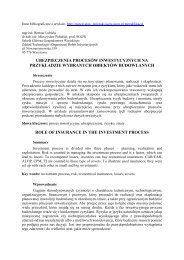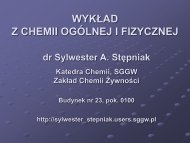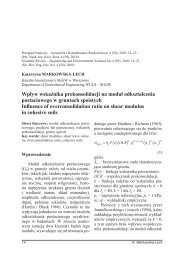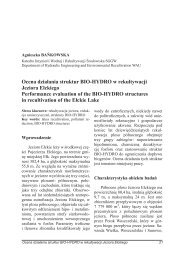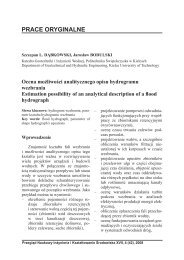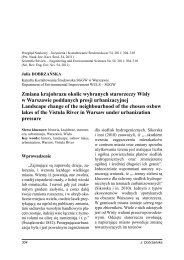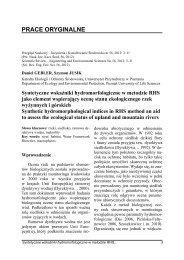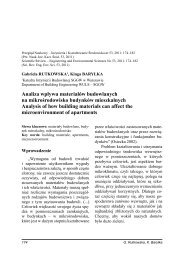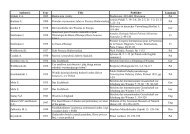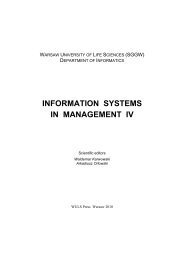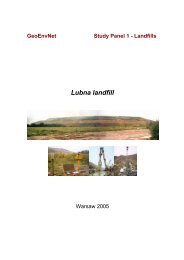46 E. Majewski, P. Sulewski, M. Raggi, D. ViaggiINTRODUCTIONSince its creation, the Common Agricultural Policy (CAP) has been undergoing significanttransformations, adapting its measures and tools to the changing economy andagriculture [Majewski at all 2009]. Till the end of the 1980’s, the CAP focused strongly onmarket interventions and was successful in fulfilling its objectives as set out in the originalTreaty of Rome. However, over the years, as a consequence of increasing productivityand technological progress, pushed by price support, significant food surpluses as wellas excessive budget expenses to control supplies have been noted [Czyżewski, Stępień2009]. Due to the situation on the EU markets and external forces (e.g. GATT, later WTO)over the last 25 years the CAP has been systematically reformed. The 2003 reform movedthe CAP from production support through area payments to producer support throughdecoupled income payments in an attempt to make the farmers and the CAP more marketoriented [Commission 2010]. CAP reforms have also introduced support not only to productivefunctions of agriculture but also to other functions creating a basis for sustainabledevelopment that takes economic, social and ecological dimensions under consideration.However, previous reforms of the CAP are still considered insufficient, as it was concludedin the last mid-term health-check review [European Commission 2008a, 2008b].In addition, new challenges are emerging in the policy context, including economic crises,climate change and the growing world food needs. This is leading to proposals for furtherchanges to be introduced in the reformed CAP after 2013. The main challenges for theCAP in next years are formulated as follows [European Commission 2010]:–––,,to preserve the food production potential throughout the EU so as to guarantee longtermfood security for European citizens”;,,to support farming communities that provide the European citizens with quality anddiversity of food produced sustainably, in line with our environmental, water and animalwelfare ambitions. The active management of natural resources by farming is akey lever to maintain the rural landscape, to combat biodiversity loss and contributesto mitigating climate change”;,,to maintain viable rural communities, for whom farming is a core economic activitycreating local employment’’.New challenges to CAP require introducing adequate operational measures. However,the success of the reforms and future shape of the European Agriculture will be to a largeextent determined by the level of farmers’ adaptation to changing institutional environment.Farmers’ reactions to expected changes in the future CAP are not fully predictable.Since there still is a number of variants of the post-2013 CAP debated at present, potentialresponses of farmers can only be investigated with the use of a set of future scenarios.Considerations based on the concept of future policy scenarios are widely used in mathematicalmodels such as partial-equilibrium models CAPRI [Wieck 2003, 2006] or AG-MEMOD [Tabeau and van Leewen 2008], as well as in general equilibrium models, suchas GTAP. In many cases hypothetical scenarios are the basis for qualitative analyses inwhich specified groups of stakeholders (e.g. farmers) evaluate future results of presentedscenarios [Lobley, Butler 2010, IDEMA 2007]. In the context of CAP reforms, scenariossettings including different degrees of CAP liberalization are often found. For example,Acta Sci. Pol.
Differences in possible reactions of eu farmers from selected european regions... 47in the study SCENAR 2020 [2007] prepared for the EC, three scenarios were analyzed:“baseline”, “regionalization” and “liberalization”). In the CAP-IRE project, A. Cristoiu,F. Sammeth and S. Gomez Paloma [2009] proposed four scenarios differentiated not onlyby the structure of support but also by the CAP’s budget:1) Baseline: the Common Agricultural Policy is continued unchanged after 2013 comparedto the previous programming period (2007–2013).2) Liberalization: all forms of public farm support (CAP and national funding) are discontinued.3) Environment: in 2020 two thirds of the CAP budget is assumed to be allocated to Pillar2 (rural development).4) Regionalization: in 2020 two thirds of the CAP budget is assumed to be allocated toPillar 1 (Market and Income support).Baseline and Liberalization (No CAP) represent the two extreme situations and seemto be very useful for analyzing farmers’ reactions to strongly contrasting general directionsof policy reforms (existing or completely withdrawn support). These two scenarioswere the basis for the analysis presented in this paper.Evaluation of differences in possible farmer’s reaction to two of the scenarios consideredin the project (Baseline and Liberalization) in the perspective of the year 2020 inseveral European regions was the main aim of the paper.RESEARCH METHODSThe study is based on data collected in the farm survey conducted within the CAP--IRE project. A standardized questionnaire containing questions about possible farmer’sreactions in two hypothetical scenarios was used for the survey. In the first scenario,named Baseline, it was assumed that the Common Agricultural Policy is continued unchangedafter 2013 (compared to the previous financial framework for 2007–2013). Thesecond scenario (No CAP) assumes complete liberalization, what would mean that allforms of public support (CAP and national funding) for the farming sector are removed.Both scenarios are unlikely to happen, but reference to extremes seems to be useful inassessing possible farmer’s responses to the new CAP.Farmers interviewed in the survey could choose from three main categories of answersin relation to those question that dealt with farm growth and investment plans:“an increase”, “no change” or “decrease”. They also had the possibility not to answera question at all or to say “I don’t know”. Taking into account rather assertive meaningbehind the answer ,,increase” and often uncertain interpretation of the differenceamong the other potential answers from a sustainability and farms growth perspective,authors have decided to simplify the analysis of answers to a dichotomous form.This resulted in the formation of two categories of farmers for each question: thosewho are declaring “an increase” and those who are not declaring “an increase”. Suchconstruction of the research enabled the use of statistical tests for two-ways arrays.The farmers answering in Baseline Scenario and in No CAP Scenario were consideredas two dependent (from a statistical point of view) groups. This allowed to apply theMcNemar test in order to compare statistical significance of differences between theOeconomia 10 (1) 2011
- Page 6 and 7: 6 A. Gawrońska, S. Paszkowskicultu
- Page 8 and 9: 8 A. Gawrońska, S. Paszkowskinumbe
- Page 10 and 11: 10 A. Gawrońska, S. PaszkowskiTabl
- Page 12: 12 A. Gawrońska, S. PaszkowskiTabl
- Page 15 and 16: The distribution of social security
- Page 17 and 18: %180,0160,0140,0120,0100,080,060,04
- Page 19: The distribution of social security
- Page 22 and 23: 22 R. Hryniewski, W. Mądry, D. Goz
- Page 24 and 25: 24 R. Hryniewski, W. Mądry, D. Goz
- Page 26 and 27: 26 R. Hryniewski, W. Mądry, D. Goz
- Page 28 and 29: 28 R. Hryniewski, W. Mądry, D. Goz
- Page 30 and 31: 30 R. Hryniewski, W. Mądry, D. Goz
- Page 32 and 33: 32 R. Hryniewski, W. Mądry, D. Goz
- Page 35 and 36: Oeconomia 10 (1) 2011, 35-43EDUCATI
- Page 37 and 38: Education as an element of competit
- Page 39 and 40: Education as an element of competit
- Page 41 and 42: Education as an element of competit
- Page 43: Education as an element of competit
- Page 48 and 49: 48 E. Majewski, P. Sulewski, M. Rag
- Page 50 and 51: 50 E. Majewski, P. Sulewski, M. Rag
- Page 52 and 53: 52 E. Majewski, P. Sulewski, M. Rag
- Page 54 and 55: 54 E. Majewski, P. Sulewski, M. Rag
- Page 56 and 57: 56 E. Majewski, P. Sulewski, M. Rag
- Page 58 and 59: 58 L. Mazal, K.J. RowlesIn the West
- Page 60 and 61: 60 L. Mazal, K.J. RowlesThe most im
- Page 62 and 63: 62 L. Mazal, K.J. RowlesGDPt= GDP0+
- Page 64 and 65: 64 L. Mazal, K.J. RowlesTHE TIME SE
- Page 66 and 67: 66 L. Mazal, K.J. RowlesTable 4. Ac
- Page 68 and 69: 68 L. Mazal, K.J. RowlesNelson Ch.R
- Page 70 and 71: 70 A. Ptak-Chmielewskastatistics, w
- Page 72 and 73: 72 A. Ptak-Chmielewska3025birth rat
- Page 74 and 75: 74 A. Ptak-ChmielewskaSECTOR OF ACT
- Page 76 and 77: 76 A. Ptak-Chmielewskabirth rate fo
- Page 78 and 79: 78 A. Ptak-Chmielewskawere trade fi
- Page 80 and 81: 80 A. Ptak-ChmielewskaREFERENCESBal
- Page 83 and 84: Oeconomia 10 (1) 2011, 83-95THE EFF
- Page 85 and 86: The effi ciency of selected real es
- Page 87 and 88: The effi ciency of selected real es
- Page 89 and 90: Table 1. Efficiency of real estate
- Page 91 and 92: The effi ciency of selected real es
- Page 93 and 94: The effi ciency of selected real es
- Page 95: The effi ciency of selected real es
- Page 98 and 99:
98 J. Sosnowski, G.A. CiepielaJalin
- Page 100 and 101:
100 J. Sosnowski, G.A. Ciepiela2007
- Page 102 and 103:
102 J. Sosnowski, G.A. CiepielaTabl
- Page 104 and 105:
104 J. Sosnowski, G.A. CiepielaTabl
- Page 106 and 107:
106 J. Sosnowski, G.A. Ciepiela1400
- Page 108 and 109:
108 J. Sosnowski, G.A. CiepielaOsek
- Page 110 and 111:
110 E. SzymańskaProducts by Activi
- Page 112 and 113:
112 E. Szymańskatroduced TFI which
- Page 114 and 115:
114 E. Szymańskabers of companies
- Page 116 and 117:
116 E. SzymańskaTable 3. Tourism v
- Page 118 and 119:
118 E. SzymańskaREFERENCESCoccossi
- Page 120 and 121:
120 J. WiśniewskaEvery society can
- Page 122 and 123:
122 J. WiśniewskaStatistical analy
- Page 124 and 125:
124 J. WiśniewskaCommon Agricultur
- Page 126 and 127:
126 J. WiśniewskaTable 3. An attem
- Page 128 and 129:
128 J. Wiśniewskathe application o
- Page 130 and 131:
130 J. Wiśniewskainstitutional cos
- Page 132 and 133:
132 J. Wiśniewskaemployed in agric
- Page 134 and 135:
134 J. WiśniewskaLong term viabili
- Page 136 and 137:
136 J. Wiśniewska--The level of re
- Page 139 and 140:
Oeconomia 10 (1) 2011, 139-148INNOV
- Page 141 and 142:
Innovativeness of food production e
- Page 143 and 144:
Innovativeness of food production e
- Page 145 and 146:
Innovativeness of food production e
- Page 147 and 148:
Innovativeness of food production e
- Page 149 and 150:
Oeconomia 10 (1) 2011, 149-158LOCAL
- Page 151 and 152:
Local governance activities in supp
- Page 153 and 154:
Local governance activities in supp
- Page 155 and 156:
Local governance activities in supp
- Page 157 and 158:
Local governance activities in supp
- Page 159 and 160:
Oeconomia 10 (1) 2011, 159-169CHANG
- Page 161 and 162:
Changes in rural women’s movement
- Page 163 and 164:
Changes in rural women’s movement
- Page 165 and 166:
Changes in rural women’s movement
- Page 167 and 168:
Changes in rural women’s movement
- Page 169:
Changes in rural women’s movement
- Page 172:
Ewa SzymańskaTourism function of M




